英国教育British Education
Lecture 6 英国教育
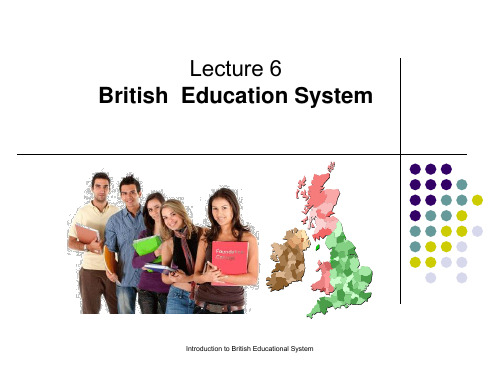
Introduction to British Educational System
General classification of British Educational System
Compulsory education Further education Higher education
Core subjects: English, Math, Science
Foundation subjects:
Design &Technology, Information and Communication Technology(ICT), History, Geography, Music, Art, Physical Education, A modern foreign language (usually French )
Introduction to British Educational System
Five stages
1st : nursery school(3-4) 2nd :Primary school(5-11) 3rd :Secondary school (11-16) 5-16 years old (compulsory education) 义务教育 16-18 中学高级班(或大学预科) 4th :18岁大学3-4(医科5) for BA/BScs;1-2 MA/MScs;PhD(35) 5th : further education : 青年和成年人的职业教育( 不含正 规的大学
Introduction to British Educational System
Text A Going to school :British Style
Chapter 7 Education in Britain 英国教育
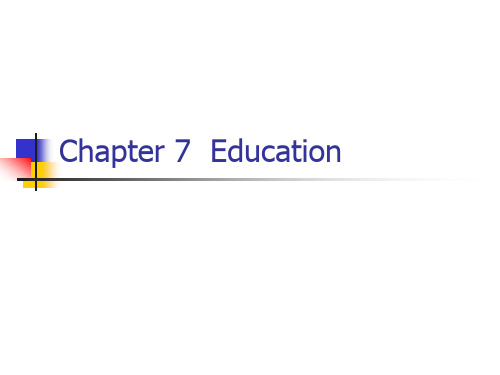
III. Higher Education
5.Degree titles are based on courses and dredits. 6. competition for universities is strong. 7.Teaching mainly adopts the lecture system, supported by tutorials and seminars 8.independent institutions enjoying academic freedom. However dependent upon finance given by government to University Funding Councils 9. tuition fees of 1,075 pounds
Oxbridge
Cambridge university has been prominent in mathematics and sciences. Oxford has produced numerous political leaders and cabinet mimisters.
The Open University
The State School
Scotland
Its state school system is comprehensive and non-selective
Northern Ireland
Its state schools are mostly divided on religious grounds into Catholic and Protestant and are often single-sex
《英语国家概况》Unit 9 British Education课件
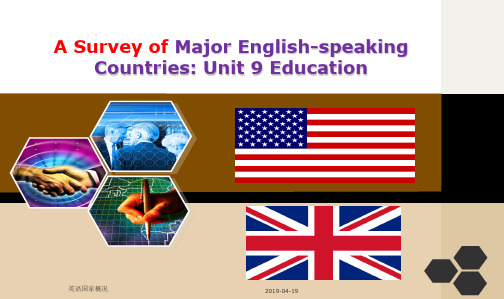
Case Study
• Compared with that in Chinese counterparts, the curriculum in the UK primary or secondary schools is much simpler. (esp. mathematics & reading)
• Prep Schools (预备学校) (from 7/8 to 13) (separate; fees; entrance exam )
• State Schools (93%) 1. Comprehensive Schools ( 综 合 中 学 ) (84%) (No
entrance exam, general education)
Tertiary education
• 延续教育(Further Education)是继小学(Primary)中学 (Secondary)教育之后的“第三级教育”(Tertiary)。为 进入高等教育或者就业打下基础。也是中国的高中学生 留学英国的关键阶段。一般来说接受延续教育的学生介 于16和18岁之间。
• Other pupils who decide not to go to university may choose to take vocational training and get the GNVQ (General National Vocational Qualification 国家专业资 格证书, 5 levels).
• At 18, they take GCE A-level examinations (Advanced General Certificate of Education 高级水平普通教育证书 =大学入学考试), usually in not more than 3 subjects. It’s necessary to have A-levels in order to go to a university or other institutions of higher education.
英美国家概况Unit 7 British Education System (英国的教育体制)

* after 5 years of secondary schooling, at about age 16, except Scottish students, the students sit their GCSE exams (General Certificate of Secondary Education)中学毕业证书考试
7. The National Curriculum (全国教学大纲)
8. public school {(英国的) 私立中学}
9. GCSE General Certificate of Secondary Education (中学毕业证书)
10. GCE-A General Certificate of Education ---Advanced (高级水平测试结业证书)
3. The influence of the church on schooling (教会对于学校教育的影响)
4. The 1944 Education Act (1944年的教育法)
5. Comprehensive school {<英>(招收学生时不分资质的)综合中学}
6. Grammar school (文法学校)
1) class inequality can be erased or continued according to educational policy(教育政策可以铲除地位的不平等,也可以使这种不平等继续存在。这说明在英国,是否受到良好教育直接影响到你的社会地位)
2) the school tie is a clear marker of social class
“The three R’s” (“reading, ’riting and ’rithmetic”) — to provide children with literacy and the other basic skills they will need to become active members of society and also to socialise children, teaching them rules and values needed to become good citizens, to participate in the community, an to contribute to the economic prosperity of an advanced industrial economy.
英国教育
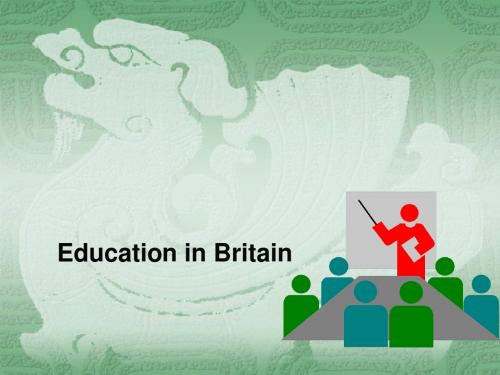
basis of a student’s A-level results.
The High School Curriculum
Age
11 – 14 Years 14 –16 Years
Curriculum
General programme of education GCSE Course : 8 /10 subjects
Primary School Subjects
One teacher teaches: Art Analysis Drama English Geography History Mathematics
National Examinations
GCSE(中等教育普通证书) :
The Redbrick universities: include all the provincial universities of the
period 1850-1930, as well as London University. They are so called because they were all built in the favorite building material of the period---red brick. Birmingham, Leicester, Liverpool and Sheffield
administered at 7, 11 and 14 years to assess each student’s progress.
Generally, Independent Schools provide a
broader curriculum than that required by law
关于英国教育的英文介绍PPT
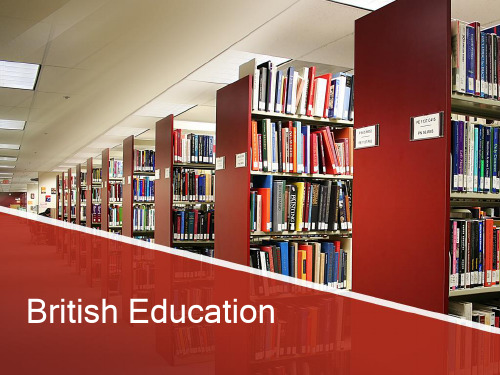
Secondary
11----16
Modern School
Separate Governmen GCSE
or Mixed t
(GCE“A”
level)
Comprehensiv e Secondary School
1)11---18
Usually Governmen
2)11---14 or Mixed(or t
15---18
separate)
3)11---16---18
GCSE (GCE“A” level)
Independent secondary school
• Public schools, unlike prep schools, are not private in the fullest sense. They are generally controlled by governing bodies,who are appointed as trustees to keep alive foundations originally begun by charitable institutions or by rich and philanthropic people; they do not try to make any financial profits, but only to balance their budgets. Their income is partly from profits and endowments,mainly from fees paid by parents.
Company Logo
mixed Central
government
and local
英国教育体系英文版
HISTORY CONTINUED
All students given right to free secondary & good education
1960’s-”Comprehensive schools” introduced-most academically capable sent to prepare Univ. while less capable vocational schools
State heavily involved –when, where, how and what children taught
Controversial Decisions
Should children be punished physically? Currently corporal punishment banned in UK
progress/course pursue 16 quit or exams for university or voc. Training Every 16 & 17 guaranteed full-time ed or training
HIGHER EDUCATION
Most Univ. public paid by gov. Univ. of Buckingham exception (priv) Long history back to 12 and 13th cent Scottish univ. St. Andrews, Glasgow,
Edinburgh and Aberdeen 14 & 15th c. Other univ. 19th and 20th centuries Large growth in 1960’s 1992 polytechs and others-univ.
英美国家概况UnitBritishEducationSystem英国的教育体制
Unit 7 British Education System (英国的教育体制)一、本单元重点内容1. The purpose of the British education system (英国教育体制的目的)2. The relationship between education and social class (教育与社会等级之间的关系)3. The influence of the church on schooling (教会对于学校教育的影响)4. The 1944 Education Act (1944年的教育法)5. Comprehensive school {<英>(招收学生时不分资质的)综合中学}6. Grammar school (文法学校)7. The National Curriculum (全国教学大纲)8. public school {(英国的) 私立中学}9. GCSE General Certificate of Secondary Education (中学毕业证书)10. GCE-A General Certificate of Education ---Advanced (高级水平测试结业证书)11. GNVQs General National Vocational Qualifications (国家专业资格证书)12. Old Universities (古老的大学)13. Open University (开放大学)二、本单元重、难点辅导1. the purpose of the British education system“The three R’s” (“reading, ’riting and ’rithmetic”) — to provide children with literacy and the other basic skills they will need tobecome active members of society and also to socialise children, teaching them rules and values needed to become good citizens, to participate in the community, an to contribute to the economicprosperity of an advanced industrial economy.教授学生3R课程(即读、写、算),为学生积极参与社会提供所需的基本知识和基本技能,同时使学生社会化,教授他们一些成为好公民所应具备的道理规范和价值观,以便能走上社会,为一个发达的工业化国家的经济繁荣作贡献。
Unit 7 British Education System (英国的教育体制)
Unit 7 British Education System (英国的教育体制)一、本单元重点内容1. The purpose of the British education system (英国教育体制的目的)2. The relationship between education and social class (教育与社会等级之间的关系)3. The influence of the church on schooling (教会对于学校教育的影响)4. The 1944 Education Act (1944年的教育法)5. Comprehensive school {<英>(招收学生时不分资质的)综合中学}6. Grammar school (文法学校)7. The National Curriculum (全国教学大纲)8. public school {(英国的) 私立中学}9. GCSE General Certificate of Secondary Education (中学毕业证书)10. GCE-A General Certificate of Education ---Advanced (高级水平测试结业证书)11. GNVQs General National Vocational Qualifications (国家专业资格证书)12. Old Universities (古老的大学)13. Open University (开放大学)二、本单元重、难点辅导1. the purpose of the British education system“The three R’s” (“reading, ’riting and ’rithmetic”) — to provide children with literacy and the other basic skills they will need to become active members of society and also to socialise children, teaching them rules and values needed to become good citizens, to participate in the community, an to contribute to the economic prosperity of an advanced industrial economy.教授学生3R课程(即读、写、算),为学生积极参与社会提供所需的基本知识和基本技能,同时使学生社会化,教授他们一些成为好公民所应具备的道理规范和价值观,以便能走上社会,为一个发达的工业化国家的经济繁荣作贡献。
Britisheducationsystem英国教育体系PPT课件
2
The Purposes of the
British Education System
“The three R’s” —reading, writing and arithmetic”
to provide children with literacy and the other basic skills they will need to become active members of society .
British Education System ——presenter
1
Main Points
➢The purposes of the British education system and the comment on them
➢The main purposes of the Chinese education system
ecБайду номын сангаасnomy.
3
My Comment on These Purposes
• To develop students’ creativity and imagination
• To have better communication skills to getting along with different people
4
The Main Purposes of the Chinese Education System
To pass the exams
To let everyone accepts education, have knowledge and skills to make life
- 1、下载文档前请自行甄别文档内容的完整性,平台不提供额外的编辑、内容补充、找答案等附加服务。
- 2、"仅部分预览"的文档,不可在线预览部分如存在完整性等问题,可反馈申请退款(可完整预览的文档不适用该条件!)。
- 3、如文档侵犯您的权益,请联系客服反馈,我们会尽快为您处理(人工客服工作时间:9:00-18:30)。
Education System
• • • • •
Period: Kindergarten/ nursery school ‘infants’ school ‘junior’ school Secondary School University Age?
General Introduction
• Primary schools
Famous People from Oxford
• People who gain the Nobel Price: 36 King: 5 Prime Minister: 25
Roger Bacon Sir Thomas More Adam Smith Qian Zhongshu Margaret Hilda Thatcher
• Secondary schools
• Other schools
Selective System
• A system for secondary schooling in Britain, under which children take an examination, the “11 plus”, in their last year of primary education. • The results of the examination determine the kind of secondary schooling each child will receive. • Those with the highest marks go to grammar schools; others may go to technical schools, and the rest – by far majority – go to secondary modern schools.
Other Schools
• County schools: state-run secondary schools, most of which are administered by the county or county borough. About half of the money comes from the local authority and the other half from the central government. • Voluntary schools: also called mission schools in other countries, secondary schools in Britain that are mostly Church of England or Roman Catholic in origin, and partly maintained and controlled by the local authority. They give a certain amount of denominational religious instruction. Education is free in such schools.
Oxford and Cambridge
• What are the two features of Oxford and Cambridge that are widely admired?
Oxford and Cambridge
• College system: whereby all students live in college during at least part of their course, which fosters a community spirit in which a useful mingling of intelligence can take place. Such colleges include tutors as well as students, and are largely selfgoverning. • Tutorial system: whereby each student gets personal tutoring once a week in his tutor’s own room. It, together with a weekly program of private study, has been considered very important at Oxford and Cambridge.
Oxford
• Oxford is the oldest university in the Englishspeaking world and lays claim to nine centuries of continuous existence. As an internationally renowned centre for teaching and research, Oxford attracts students and scholars from across the globe, with almost a quarter of students from overseas. More than 130 nationalities are represented among a student population of over 18,000.
Independent Schools
• Public schools: secondary private boarding schools that prepare students chiefly for universities. They laid the foundations of English education, but now are generally restricted to a comparatively small section of the population, mainly the rich and conservative in politics. Eton, Harrow and Rugby are the 3 most famous public schools. • Prep schools: small private boarding schools for children up to 7 or 8 years old, which help to prepare the children for the “common entrance” examination at the age of 13 for admission to a public school, and where Latin, French and mathematics are all started early.
The Universities
• Oxford and Cambridge [12th and 13th centuries] • 4 Scottish universities [15th and 16th centuries] • St. Andrews, Glasgow, Aberdeen, Edinburgh • 3 other universities containing colleges [19th century] • Durham, London, Wales • 19th- and 20th-century universities starting from colleges • Post-war universities, or university colleges, teaching a more balanced mixture of subjects • Universities of technology, promoted during the 1960s • The Open University
Educ us what we are.
--- Helvetius (French philosopher)
Education begins a gentleman; conversation completes him.
--- English proverb
• Very quietly I take my leave As quietly as I came here; Quietly I wave good-bye To the rosy clouds in the western sky. • The golden willows by the riverside Are young brides in the setting sun; Their reflections on the shimmering waves Always linger in the depth of my heart. • The floating heart growing in the sludge Sways leisurely under the water; In the gentle waves of Cambridge I would be a water plant! • That pool under the shade of elm trees Holds not water but the rainbow from the sky; Shattered to pieces among the duckweeds Is the sediment of a rainbow-like dream?
Cambridge
轻轻的我走了, 正如我轻轻的来; 我轻轻的招手, 作别西天的云彩。 那河畔的金柳 是夕阳中的新娘 波光里的艳影, 在我的心头荡漾。 软泥上的青荇, 油油的在水底招 摇; 在康河的柔波里, 我甘心做一条水草
那榆荫下的一潭, 不是清泉,是天上虹 揉碎在浮藻间, 沉淀着彩虹似的梦。 寻梦?撑一支长篙, 向青草更青处漫溯, 满载一船星辉, 在星辉斑斓里放歌 但我不能放歌, 悄悄是别离的笙箫; 夏虫也为我沉默, 沉默是今晚的康桥! 悄悄的我走了, 正如我悄悄的来; 我挥一挥衣袖, 不带走一片云彩。
